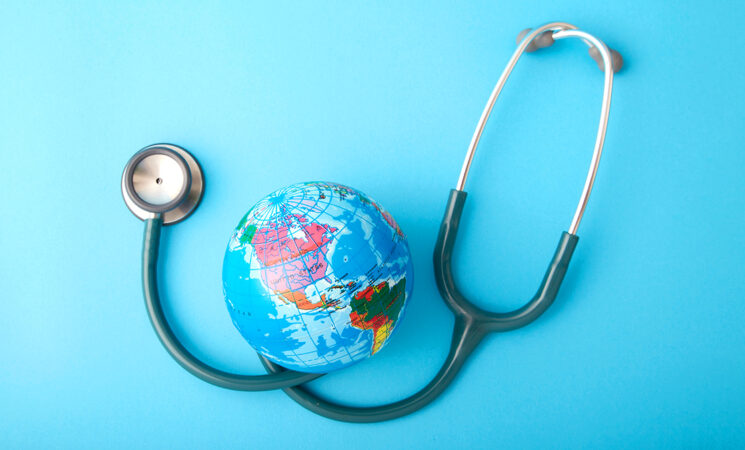28 November 2020, NIICE Commentary 6540
Sweta Kumari
Today, when COVID-19 has house arrested the entire globe, the state of the public health systems is under rigorous scrutiny. Departing from the general understanding in international relations where the Global South remains more susceptible in case of outbreak of epidemics or the occurrence of natural disasters, the pandemic has claimed hundreds of thousands of lives almost symmetrically in all nations. If one looks at the statistics, the highest number of casualties have occurred in either developed or fairly advanced countries. For instance, the United States, despite having the best medical technology and highest per capita spending of its GDP in the healthcare sector, the country alone accounts for approximately 18 percent of the total deaths caused by the COVID-19 disease across the world. Indeed, there are many reasons behind it, but, one of the prominent analyses has been the underlying or pre-existing health conditions of COVID-19 patients such as hypertension, diabetes, obesity, mental illness, and cardiovascular diseases that have led to comorbidity. As per the data released by the US Centers for Disease Control and Prevention, the death rates in these patients are 12 times more in comparison with those who don’t have these conditions.
The outreach and intensity of the Coronavirus pandemic have positioned health as one of the significant non-traditional security threats. Any country with such vulnerabilities will not only be prone to lose its human capital, but it will also tend to see an economic downslide which is quite evident in the current times. The question then arises that how can health security, which seems like an abstract connotation be achieved. Also, as a subcontinent, do India and its neighbours have a significant role to play in this?
One effective approach toward enhancing health security can be the promotion of integrative health practice. In recent years, the idea of wellness and holistic health through the inclusion of some of the traditional and non-conventional health practices in the conventional medical system through evidence-based scientific research has become quite popular in the healthcare debates. The US National Center for Complementary and Integrative Health (NCCIH) defines integrative health as “Integrative health care often brings conventional and complementary approaches together in a coordinated way. It emphasises a holistic, patient-focused approach to health care and wellness – often including mental, emotional, functional, spiritual, social, and community aspects – and treating the whole person rather than, for example, one organ system. It aims for well-coordinated care between different providers and institutions.”
Certainly, there is no direct correlation between curing COVID-19 and traditional medicine. However, there is a vast possibility of the preventive role that these body and mind practices can play. By helping the human race to overcome the modern lifestyle-based ailments, the vulnerabilities can remarkably be reduced.
Some of the prominent body and mind practices like Yoga, Meditation and Ayurveda that have their roots in this region, are now backed by scientific research and have gained tremendous popularity internationally. The World Health Organisation (WHO) Traditional Medicine Strategy 2014–2023 highlights the need “to support the Member States in developing proactive policies and implementing action plans that will strengthen the role traditional medicine plays in keeping populations healthy.” Foreign agencies such as the US Department of Defense have already been incorporating Yoga and meditation in their healthcare framework to help both personnel and veterans.
Countries like India, Nepal, Myanmar, and Sri Lanka are not only home to these therapies and practices, but they also have a lot of potentials to emerge as a hub for integrative health practices and tap revenues through health tourism. However, there are many obstacles to this idea. Firstly, there is the existence of a parochial bias towards these practices in the conventional health system, which can be removed only through rigorous scientific investigations by collaborating among each other and with agencies such the WHO and NCCIH. Secondly, there is the question of legitimacy. To overcome fraud and quackery and promote health tourism, government agencies can provide a license or certificate to private agencies and complementary health providers. The Indian Ministry of AYUSH (Ayurveda, Yoga & Naturopathy, Unani, Siddha and Homoeopathy) has taken some initiatives in this direction, but it is a long road to go. Adequate funding and legal framework will be required in this domain.
The ever-increasing global popularity and wider acceptance, especially in Western countries, are push factors towards the model of integrative health where the inclusion of traditional and non-conventional modalities along with the mainstream medical system can be done. The declaration of 21st June as the ‘International Day of Yoga’ by the United Nations was a big leap forward in this direction. The preventive nature of these practices can prove helpful in achieving health security in a cost-effective manner and help both advanced and developing countries. India and the neighbouring countries with state-of-the-art knowledge of traditional therapies and health practices can emerge as major players in this avenue. However, what is needed is the identification of the importance of this issue and the determination to proceed through cooperation.

